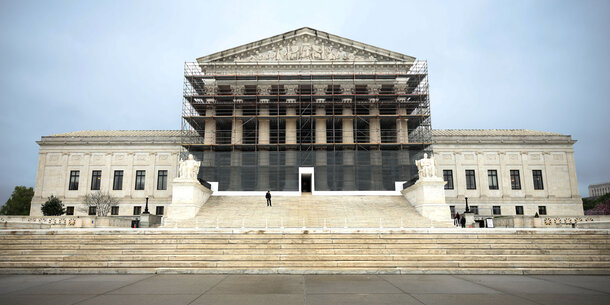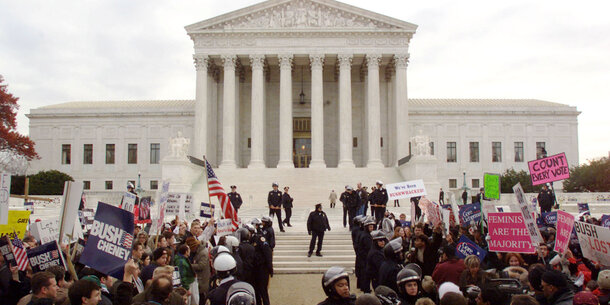You’re reading The Briefing, Michael Waldman’s weekly newsletter. Click here to receive it every week in your inbox.
Last week, Justice Samuel Alito returned to a favored forum — the Wall Street Journal op-ed page. For decades, the page has been an invigorating mix of insightful essays, right-wing boilerplate, and occasional conspiracy theories. This morning’s headlines include “Climate Change Obsession Is a Real Mental Disorder” and “FDR Made the Depression Great Again.” Now the Journal appears to be hosting a new genre: historical fiction.
In an interview, Alito declared, “I know this is a controversial view, but I’m willing to say it. No provision in the Constitution gives them the authority to regulate the Supreme Court — period.” The mix of self-congratulation and tendentiousness was distinctly Alito’s, familiar to anyone who read the Dobbs ruling.
This “controversial view” is wrong as history and law. It also marks a startling intervention by a justice in an ongoing legislative fight. Alito spoke soon after the Senate Judiciary Committee advanced legislation that would require the Court to adopt a binding code of ethics, while imposing stricter rules for recusal and disclosures for gifts and travel. Were such a law to pass, surely it would wind up at the justice’s desk.
Alito’s pronouncement ignores the long history of congressional regulation of the Supreme Court.
Over the years, Congress has expanded (and shrunk) the size of the Court and changed its jurisdiction. As my colleague Martha Kinsella recently pointed out, Congress has had a hand in overseeing the justices’ ethical conduct since the time of the founding. Congress wrote the first mandatory oath for Supreme Court justices in 1789. It set recusal rules for the justices in 1948 and financial and income disclosure rules in 1978. Just last year, a bipartisan group of lawmakers increased transparency requirements around the justices’ securities transactions.
Yes, judicial independence must be respected. Checks and balances matter. But Congress regulates ethics in the executive branch, for example — another distinct branch. And both federal prosecutors and judges appropriately police congressional misconduct. (Just ask recently indicted Rep. George Santos of New York.) Ethics legislation upholds basic checks and balances. And it reflects a core insight: nobody is so wise that they should be the judge in their own case.
Plainly, the Court needs reform. Public trust in the institution has collapsed to the lowest level ever recorded in polls. The justices work in a swirl of secret billionaire backers, unacknowledged conflicts of interest, eye-popping book deals, and a lavishly funded Federalist Society political machine that has driven the Court’s lurch to the right.
A mandatory ethics code should be just a first modest step. There is wide and bipartisan support for another idea: 18-year term limits for the justices. Nobody should have that much public power for too long. Alito’s glib insistence that Congress should butt out shows the risk of an unaccountable institution.
Over the years, as the Supreme Court’s power has grown, it has evolved from upholding judicial review to what critics from left and right have variously decried as judicial imperialism. Alito has added a new twist: judicial chutzpah.



